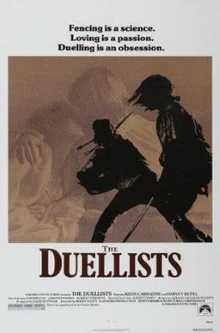Just as the promotion for Ridley Scott’s latest film is getting underway, we’re watching the director’s debut film from 1977. It tells a rather incredible story of two duellists, adapted from a short story by Joseph Conrad and that was in turn seemingly inspired by real events. I do wish that it goes deeper into why one of them Gabriel Feraud acts as he does, But there is no question that this is a beautifully shot film with an intriguing premise and some amazing fight choreography.
In 1800, Lieutenant Gabriel Feraud wins a sword duel, wounding the other man who turns out to be the nephew of the city. A general orders Lieutenant Armand d’Hubert to find and arrest him. When d’Hubert tracks Feraud down in a salon and confronts him, Feraud acts as if this were a grave insult and challenges him to a duel. d’Hubert is incredulous and tries to refuse, but Feraud is so insistent and he gives in and the fight ends with d’Hubert wounding Feraud’s arm. Later war breaks out and d’Hubert thinks that this is the end of the matter. But six months later, he meets Feraud again in Augsburg who immediately insists on a rematch. This time d’Hubert is seriously wounded in the chest but survives. A friend warns him that Feraud will not give up and d’Hubert’s only options are to stay away from him, to be promoted to a rank higher than Feraud or to resign from the military and become a civilian. Indeed this pattern would continue for years and the feud between the two becomes well known to others though no one knows the reason for the argument between the two.
As I said, this looks like a ridiculous premise yet it seems that it does have some basis in reality. I don’t quite understand why Feraud is allowed to act as he does without being subjected to military discipline but I suppose it is part of the recognized code of honor and he does seem to have his friends and supporters. On his end, d’Hubert keeps being pulled in even as he tries to reconcile with Feraud at every opportunity, including one occasion when they join together to fight against Cossacks during Napoleon’s invasion of Russia. He thinks it is a ridiculous farce but can’t refuse to stand up for his own honor as well. I do wish that the film goes deeper into Feraud’s side of the matter. Does he simply love to fight? Did he really take to heart d’Hubert ‘s passing dismissal of Napoleon? We don’t know and neither does d’Hubert really and I guess that is why this is a kind of tragicomedy. Feraud’s presence as a thorn in d’Hubert is a constant that persists past his lovers, marriage and rise in career to the rank of general.
On a technical level, this is of course a beautifully shot film and for good reason. Scott was consciously imitating the visual style of Stanley Kubrick’s Barry Lyndon, released only two years before this. The sword choreography early on is excellent as we can them fight with feints, leaning away with their torso, footwork and so on. Later on, they devolve into brutal affairs, determined as much by luck as anything which I suppose is in keeping with the theme of this story. The film is a little lacking in that it really is just all about d’Hubert’s relationship with Feraud who is for reasons that are obscure even to d’Hubert is obsessed with pursing a feud with him to a ridiculous extent. This narrow focus prevents this from being the kind of great classic that Barry Lyndon is.
Still I enjoyed this very much and it is an easy film to watch with its fight scenes and straightforward story. It is curious and impressive that Scott managed to make this as his debut film with a decent budget and recognizable stars. I suppose it was because he had already established a track record by making commercials before starting his first film.
